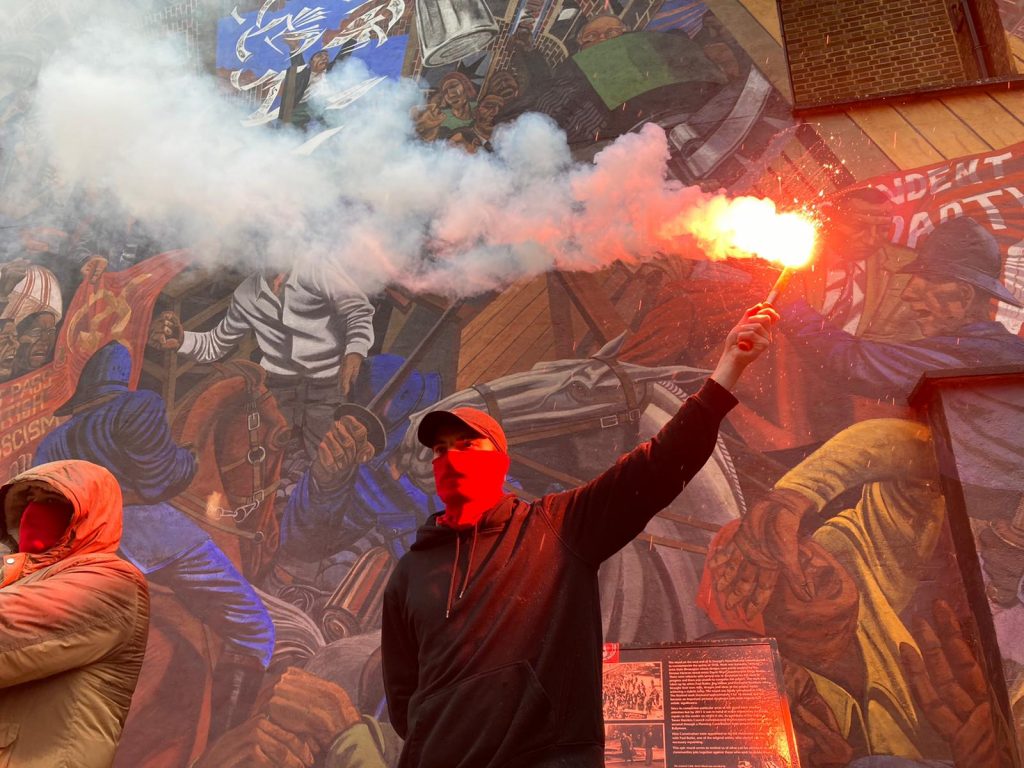This year will mark 87 years since the Battle of Cable Street, a moment of political struggle that the Communist Party and Young Communist League in London rightfully claim as a part of their heritage. It was the organising work of then future Communist MP for Stepney, Phil Piratin, and the London District Communist Party which ensured the victory of the militant and diverse working class of East London over the British Union of Fascists (BUF) on October 4 1936. On that day, Communists united workers to overturn lorries, assemble barricades across Cable Street and confront the threat posed to their class by Oswald Mosley’s blackshirts.
In 1936, the ideology of the British ruling class was one of collective loyalty to the monarchy, to the Empire, and a chauvinism for Britain’s global position, supported by notions of racial supremacy. The BUF emerged as a radical mutation of this ideology.
The fascist movement in England had been growing since the early 1930s, amidst a period of economic crisis and high unemployment, in which the capitalist class had a heightened fear of organised working-class militancy. The BUF played an invaluable role for the capitalists: dividing the working class into rival ethnic, religious and cultural identities. Mosley promoted collaboration between the majority of workers and the ruling class to fight “traitors” and “parasites” at the bottom of society rather than the top.
Today, the situation has shifted dramatically. The ruling class no longer champions a grand narrative of collective purpose. Instead, their ideology is postmodern individualism, loyalty to no one but yourself. Since the 1980s, in the shadow of Margaret Thatcher’s infamous pronouncement that “greed is good,” we have been encouraged not to ally with the ruling class on the basis of nation or race, but to think of ourselves as the capitalists: investors, stakeholders, entrepreneurs; instead of scapegoating a few minorities, we are conditioned to be generally hostile and treat everyone as a rival in a never-ending economic rat race where we are all competitors.
This is why there isn’t a need to try and unite the majority of the working class behind a grand collective plan in order for us to cooperate with the rich. On the contrary, the corporate elite fragment us, categorising us into distinct identities, each vying for attention, each celebrated with its own corporate-backed parade or awareness campaign.
Over the last 40 years, broad class consciousness has been shattered into countless identities each with their own subjective truths, challenges, and perspectives. Hand-in-hand with the decline of heavy industry and the rise of the service sector, identity politics has neatly hidden our relationship to the means of production under a pile of labels and costumes. In the 1930s, fascism sought to suppress class struggle by promoting national unity and loyalty to the state, often using brutal violence to bring different classes together under a nationalist banner.
Modern identity politics, on the other hand, doesn’t need to use force in the same way: the working class is divided into conflicting identities, each picked off one by one, encouraged to collaborate through state policies such as right-to-buy and corporate pandering such as an LGBT flag on a Shell oil refinery. Class oppression is deliberately obscured, and workers do not regard their class position as their primary identity, or their class interests as their primary interests.
In his book Our Flag Stays Red, Phil Piratin says this of the events of 4th October 1936:
“Cable Street was a great scene. Never was there such unity of all sections of the working class as was seen on the barricades at Cable Street. People whose lives were poles apart, though living within a few hundred yards of each other; bearded Orthodox Jews and rough-and-ready Irish Catholic dockers — these were the workers that the fascists were trying to stir up against each other. The struggle led by the Communist Party against the fascists had brought them together against their common enemies, and their lackeys.”
‘Anti-fascism’ and the events of Cable Street are fetishised by the liberal establishment today as an uprising in favour of ‘diversity’ and ‘multiculturalism’ – a riot to win the modern world we see around us. If we are to build on the legacy of Cable Street, it’s crucial we recognise the nature of their fight against fascism, and what the unity that challenged ruling class ideology meant that day.
The CPGB didn’t mount a resistance to the blackshirts merely to stand against the bigotry and hatred at the core of their beliefs; they stood against the reasons why that bigotry was being sown in the first place. We must not forget that the clash against Mosely’s blackshirts and the fascists of the 1930s was never primarily because of this or that prejudice against any race. It was fundamentally because they were soldiers for capitalism and our forebears were soldiers for socialism. The workers at Cable Street were fighting against the division of the working class not because unity is nice or morally good, but because they knew working-class unity was needed in the fight against the rich.
It still is today.
In today’s world of liberal cowardice, young people are conditioned to keep their heads down and placidly participate in self-centred consumerism, devoid of any dissenting political passion or ideological fervour. The heroes of Cable Street rejected the mainstream thought of their day and united ordinary people. We must learn from and honour their bravery by doing the same. Cable Street must never become a vacuous endorsement of the liberal status quo: we too must challenge the divisions that are pushed on us today, and unite our people on class lines.
We must remember the heroes of the YCL in 1936 for one thing above all: having the faith in their beliefs to risk their lives and liberty, to stand together and fight.
Joe Smith
Chair of YCL London District



